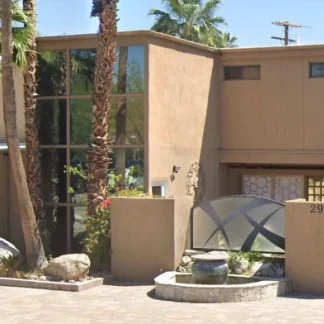Alano Club
The Alano Club is an Alcoholics Anonymous-affiliated recovery program located in...
Life’s Journey Center is an alcohol and drug rehab located in Palm Springs, California, with treatment for adults. They offer detox, inpatient (IP), dual diagnosis care, case management, and aftercare programs, and specialized programs for eating and gambling disorders. Specialized programs are available for justice-involved persons. Programs are available in English and Spanish.
Upon admission, clients are evaluated and receive a personalized treatment program. Detox includes medication and holistic therapy to ease symptoms and withdrawal pains. Clients are monitored 24/7 as they begin the transition into sobriety.
Life’s Journey Centers’s IP provides clients with group, family, and individual counseling using cognitive behavioral therapy (CBT) and dialectical behavioral therapy (DBT) approaches. Peer support, emotional wellness training, life skills development, and spiritual healing are all available.
Alumni receive care and support through alumni group meetings. An aftercare life coach is available to help clients maintain sobriety. Additional referrals for specialized care in outside facilities can also be made.
Life’s Journey Centers is in-network with many insurance providers, including Aetna, Cigna, Humana, and United Healthcare. Self-pay and financing options are also available. Insurance plans vary, so be sure to verify coverage information and out of network benefits with the insurer.
Contact us for more information: (877) 864-6363

Connect with Lifes Journey Center by calling their admissions team directly.
(877) 864-6363 Website Get DirectionsAnimal therapy (aka pet therapy or animal-assisted therapy) can be very healing, as it allows patients to bond with animals, who give unconditional love. This is particularly useful for those who suffered trauma by the hands of people, who may be able to trust and form closer attachments to animals than humans at certain stages of rehabilitation.
Equine therapy, aka equine-assisted therapy (EAT), is a form of experiential therapy that involves interactions and activities with horses. It does not necessarily involve riding horses, but all activities related to horses, such as feeding, grooming, haltering and leading them. A mental health professional frequently oversees the activities (often in conjunction with a horse professional), and helps patients process their thoughts, feelings, and behavior patterns during and/or after the interaction.
Research clearly demonstrates that recovery is far more successful and sustainable when loved ones like family members participate in rehab and substance abuse treatment. Genetic factors may be at play when it comes to drug and alcohol addiction, as well as mental health issues. Family dynamics often play a critical role in addiction triggers, and if properly educated, family members can be a strong source of support when it comes to rehabilitation.
Equine therapy, aka equine-assisted therapy (EAT), is a form of experiential therapy that involves interactions and activities with horses. It does not necessarily involve riding horses, but all activities related to horses, such as feeding, grooming, haltering and leading them. A mental health professional frequently oversees the activities (often in conjunction with a horse professional), and helps patients process their thoughts, feelings, and behavior patterns during and/or after the interaction.
Research clearly demonstrates that recovery is far more successful and sustainable when loved ones like family members participate in rehab and substance abuse treatment. Genetic factors may be at play when it comes to drug and alcohol addiction, as well as mental health issues. Family dynamics often play a critical role in addiction triggers, and if properly educated, family members can be a strong source of support when it comes to rehabilitation.
Research clearly demonstrates that recovery is far more successful and sustainable when loved ones like family members participate in rehab and substance abuse treatment. Genetic factors may be at play when it comes to drug and alcohol addiction, as well as mental health issues. Family dynamics often play a critical role in addiction triggers, and if properly educated, family members can be a strong source of support when it comes to rehabilitation.
The Alano Club is an Alcoholics Anonymous-affiliated recovery program located in...
AA - Alcoholics Anonymous - Central Intergroup, based out of Cathedral City, Cal...
Substance Abuse Program is a drug rehab in Palm Springs, California, for alcohol...
Recover Palm Springs, located in Cathedral City, California, is an alcohol and d...